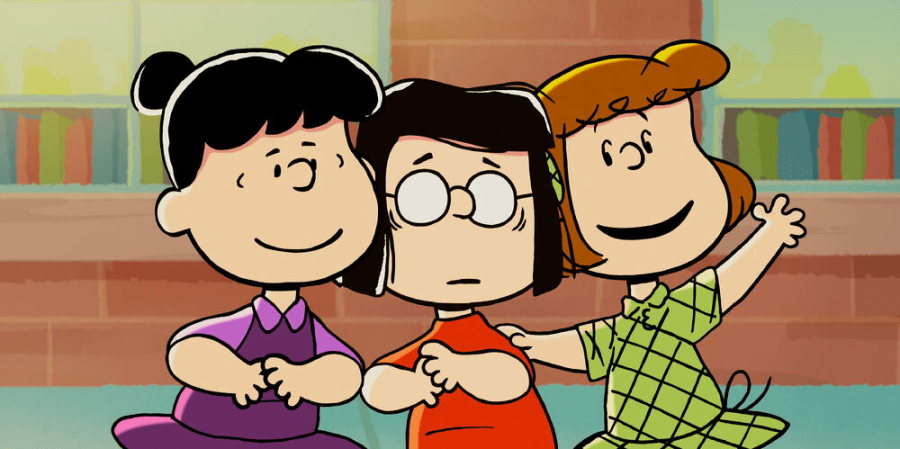Apple has been a surprisingly good partner to the Peanuts brand since acquiring the home streaming rights back in 2020. On Apple TV+, you can not only watch all of the classic TV specials, but also the classic TV series, as well as quite a few new shows and specials produced with WildBrain. It’s the latter, specials, and in particular, Snoopy Presents: One-of-a-Kind Marcie, that I felt compelled to discuss.
Although keeping mostly in the spirit of the contemporary Peanuts brand from decades in the past, I’ve felt a bit ambivalent towards series like The Snoopy Show and specials like Snoopy Presents: Lucy’s School. They’re certainly competently executed and have some stand-out moments, but whether it’s the occasional personality that feels just a bit off-character, off-brand voice, or overly saccharin and non-substantive gag or story, I haven’t enjoyed these as much as I would typically expect. Of course, part of that is I’m a 50-year-old father rather than a 10-year-old, so my perspective and expectations are clearly different, but I think One-of-a-Kind Marcie, which was just released on August 18, 2023, was able to raise the bar to the point where I can appreciate the direction these are going so much more.

Any introspective fan of classic Peanuts will tell you that one of the reasons why the IP is so durable is that each of the core characters has real depth. They have clear emotional and other psychological issues and demons that they wrestle with regularly. Charles M. Schulz had a gift for getting that pathos across in a relatively short series of four panels. These aren’t your average comic strip kids and the best of the classic TV specials were able to explore that.
Having created new strips for an amazing run of 50 years, 1950 – 2000, it’s fair to say that recognizing disorders at that time clinically outside what was considered neurotypical was either non-existent or in its infancy. These characters were just regular oddballs. In retrospect, however, many of the Peanuts characters exhibited characteristics that today would be diagnosed as Attention-Deficit/Hyperactivity Disorder (ADHD), bipolar disorder, emotional lability, depression, Autism Spectrum Disorder (ASD), and more. Again, it was a Schulz gift that he was able to explore some of these issues in relatively thoughtful and respectful ways without necessarily being conscious of their existence.
Enter the post-2020 Apple-led Peanuts. With a better understanding of everyday disorders that fall outside of the neurotypical range, Peanuts can become even more relevant, building on what Schulz, consciously or otherwise, established with these personalities all those years ago. And I can say with confidence that One-of-a-Kind Marcie not only goes there, but succeeds in a way that few other post-Schulz productions have been able.
I’ll quote the synopsis from the excellent Peanuts Wiki:
“One-of-a-Kind Marcie follows Marcie, an introvert who loves her solitude but also enjoys helping her friends. As they train for the school golf championship, Marcie assists Peppermint Patty as her caddie, offering thoughtful and deliberate advice to help her win. Meanwhile, after coming up with brilliant solutions to her classmates’ problems — from hallway traffic jams to lunchtime pizza shortages — Marcie is unexpectedly elected as class president… a role she never wanted. Suddenly thrust into the spotlight, Marcie struggles to cope with the expectations of her new job and retreats as far from the public eye as possible. As the golf championship begins, Marcie is still in hiding and Peppermint Patty is forced to tee off with Charlie Brown filling in as her caddie. But after some wise advice and a little introspection, Marcie realizes she can still make a difference for her friends and the school — she will just have to buck other people’s expectations and do it her own unique way.“
This is where the previous decades of Peanuts exposure pays off for those of us along for the ride for any significant portion. Of course Marcie is an introvert. Of course she has signs of ASD. Of course she complains of sensory overload. We’ve known it all along, if only subconsciously. As with those who suffer from those and other issues, we love her anyway. And for those of us with some of those same issues, it’s always good to feel heard without feeling pandered to.
The best part is even without the excellent psychological exploration and expansion of a beloved, but minor, Peanuts character, the rest of the special is similarly well-done. The story is well-paced and well-structured, the voices are pretty much spot-on, and the art style is an effective merger of classic Peanuts style with lush backgrounds and comic strip-like incidental effects. It’s a genuinely effective modernization and one well worth watching.






 Your total news and information resource for all things Science, Technology, Engineering / Mathematics, Art, and Medicine / Health.
Your total news and information resource for all things Science, Technology, Engineering / Mathematics, Art, and Medicine / Health.
Leave a Comment